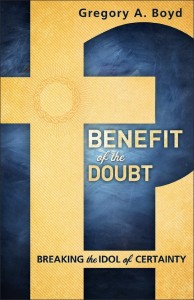Doubt, for many christians, has become a bad word. Many, in fact, are told not to let any doubt enter their minds. Worse yet, they are told not to speak any doubting words. While some say not to even mention a doubtful word, Boyd has written a book about the positive effect that doubt can play in our lives. How can we have such opposing views on doubt and faith? Boyd argues, and it is his main thesis, that there are two very different ways of understanding our faith in God: we will either view our faith as contractual or covenantal. He shows that how we read and understand the bible will be determined by which of these two understands of faith we have. Biblical faith, as Boyd shows, is covenantal.
One of the things that I love about this book is that it is that while it shows that faith as “simply a mental conviction that something is true” can actually be idolatrous, it doesn’t make an idol out of doubt either. I read somewhere that modern people were like architects who believed that they were building the perfect building. Post-modern people, on the other hand, are more like archeologists who are examining ruins without any attempt to rebuild. Boyd in no way holds up doubt and skepticism as trophies. He simply points out that they are a natural part of our faith journey and that it is better to be honest with our doubts before God than to pretend that we don’t have any. Why? Because that is what covenant is all about–relationship. If faith is about deepening our relationship with God, than let’s bring our doubts out in the open deal with them. Better to limp than to have never wrestled. As I read this book I found my heart “strangely warmed.” Is it ironic that a book about doubt helped build up my faith? I don’t think so, because while Boyd is a theologian, he is also a pastor and while I enjoyed reading Boyd’s arguments, I also found his writing very pastoral. Boyd makes some strong statements, but he is not “in your face”. His writing is both compelling and compassionate and, perhaps more than on any topic, both of these are needed when dealing with people’s faith.
This is a book I would love to get into students’ hands (and heads) before they graduate from High School. Their parents could probably use a copy too.
*I received an advanced copy of this book from NetGalley
